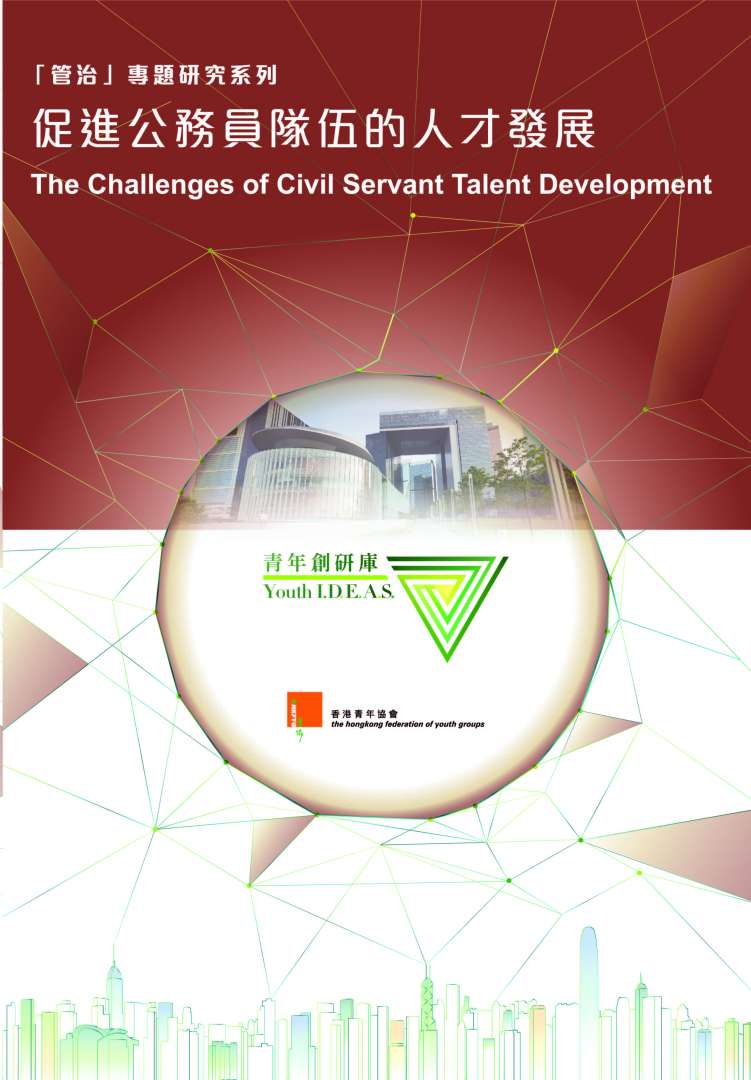The Challenges of Civil Servant Talent Development
Youth I.D.E.A.S. 61
Governance
The Challenges of Civil Servant Talent Development
14 June, 2021

Good public governance relies on people with outstanding talent performing their duties and displaying leadership skills in their positions. In Hong Kong, the Government appoints individuals to the Executive Council, the various advisory bodies, and the political accountable team through the Political Appointment System. The Legislative Council, District Councils, political parties, and other social organisations are the platforms to develop such potential.
According to Hong Kong’s Civil Service Code, the Civil Service is the backbone of the HKSAR Government. It is responsible to, and supports, the Chief Executive and the Government of the day in formulating, explaining and implementing policies; conducting administrative affairs; and serving the community by delivering public services; and undertaking law enforcement. Directorate-Grade and Administrative-Officer-Grade Civil Servants play an important role in the governance landscape of the HKSAR as many of the Principal Officials of the Governance Team come from within the Civil Service. As a result, the Civil Service is another important channel for training government officials in the territory. Civil Service is also one of the most popular career choices for young people who help to ensure its continuity and sustainability.
However, with the changes in recent years to the city’s political and social landscape that have jeopardised the credibility of the SAR Government, it is unsurprising that the Civil Service is at the centre of this storm. Given the city’s increasingly complicated social development, and the full implementation of the “patriots administering Hong Kong” principle, it is inevitable that the public would have a higher expectation of the Civil Service regarding its capability and quality.
Given this background, there is concern about whether the Civil Service will still be attractive enough to attract, retain and nurture the needed talent.
This study looks at the challenges of talent development in the Civil Service through exploring young peoples’ considerations in joining this part of the workforce. Recommendations will be put forward with an aim of making the Civil Service better prepared to perform its various roles and functions through the current set of difficulties. By doing so, this study hopes to present some insights about how the Hong Kong Government can maintain good governance.
In conducting this study, data was collected between March and April 2021 through: an on-site survey of 527 young people (aged 18 to 34); parallel-case interviews with 15 similar individuals; and research-exclusive interviews with 5 academics and experts.
Discussion
- According to respondents, the contribution made by the Civil Service is highly rated, but its performance in recent years is regarded as unremarkable.
- Respondents have various concerns or worries when thinking about if they would join the Civil Service. There are also concerns raised about the possibility of a brain drain.2.1 The majority of respondents are not interested in joining the Civil Service. Various reasons need to be taken into account.
2.2 The rate of resignations from the Civil Service has been increasing in recent years; posing the problem of a brain drain.
- In amongst the ever-changing and complicated social environment, Civil Servants’ acumen to the needs of society and the country, as well as their ability to take a forward-looking perspective in connecting to the world, is being challenged.3.1 Under the “One Country, Two Systems” principle, it is important for Civil Servants to have a sense of national identity. Dealing with the public they need to approach tasks with political shrewdness.
3.2 The work of nurturing the talents of the Civil Service is important to Hong Kong. The soon-to-commence Civil Service College’s role and position in training the Civil Service is crucial.
- The Government lacks public trust. Trust between the Government and the Civil Service also faces challenges. A concerted, joint effort to support each other so good performances in policy formation and governance can flourish is a primary approach to rebuild mutual trust.
Recommendations
- Open up channels for the expansion of the spotting and identification of talent.
- Set up a framework to broaden Civil Servants’ perspective of society, the country, and the international community.
- The soon-to-commence Civil Service College to lead collaborations with academic institutions to enhance the quality of Civil Servants’ capabilities in formulating policies and internationalising the Civil Service.
- Promote public service spirit of the profession.




